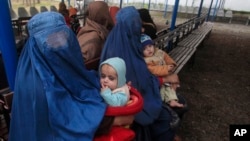Pakistan and Afghanistan have announced plans to work together over the next four months to try to document about 1 million Afghans who are believed to be living illegally in Pakistani cities.
The documentation effort is aimed at trying to determine the deadline for when all Afghan refugees in Pakistan are expected to be safely and voluntarily repatriated.
The protracted Afghan refugee situation in Pakistan has become a major irritant in bilateral relations because Pakistani authorities are increasingly blaming the refugees for a rise in criminal and militant activity in parts of the country. The United Nations estimates there are 1.6 million registered refugees, and about 1 million who remain undocumented.
Islamabad’s renewed counterterrorism efforts include measures to repatriate both official and unofficial Afghan refugees from Pakistan.
Over the past three months, police raids in Afghan-dominated neighborhoods and refugee camps have helped spur an exodus of more than 50,000 Afghans back into Afghanistan.
Most of them are said to be undocumented Afghans whom Pakistani authorities consider a security threat.
Pakistan wants all registered Afghan refugees to leave by the end of 2015.
However, the sudden influx of returning Afghans is already worrisome to the government in Kabul, which is facing severe budget and security problems at a time when international assistance has decreased.
However, this week’s high-level discussions in Islamabad appear to have eased tensions and led to a more cooperative effort to document unregistered Afghans.
Chief Commissioner of Afghan Refugees Imran Zeb Khan told VOA his institution will lead the process of documenting more than 1 million Afghans. He said a joint six-member committee of Afghan and Pakistani experts will oversee the massive exercise.
“The entire process of documentation will take four months," Khan said. "And within these four months, when we document these 1 million [Afghans], there will be a window of opportunity for Afghans either they avail the reintegration grant being provided by the government of Afghanistan inside Afghanistan and they return. or if they want to live in Pakistan, they have to regulate that stay by having passports and travel documents and relevant visas to be issued to them.”
Information campaign
Khan said the effort will begin with an information campaign encouraging Afghans to register themselves.
Khan explained that the registration of these Afghans, whom he referred to as illegal economic migrants, does not mean they will be granted refugee status in Pakistan.
He admitted a crackdown has been underway in the northwestern Khyber-Pakhtunkhwa province against people who are unable to establish their identities during search operations in suspicious localities. But he dismissed suggestions the crackdown is Afghan-specific or that it has targeted registered refugees.
“Within that crackdown there was a spontaneous return of unregistered Afghans back to their homeland," Khan said.
"But let me make it very clear this security scan was carried out, is being carried out and will be carried out from time to time to see if there are people without documents and if they are living in suspicion conditions, security and law enforcing agencies will work on that," he added.
Afghan Minister for Refugees and Reconstruction Sayed Hossein Alimi Balkhi assured his Pakistani counterpart the national unity government will closely cooperate in resolving the protracted refugee situation.
International assistance
In this week's meeting in Islamabad, the U.N., Pakistan and Afghanistan agreed to launch a mission contacting global donors to provide funds for improving conditions inside Afghanistan, such as providing shelter, employment and other basic facilities to returnees. The effort will be led by the Afghan government.
U.N. officials also sound confident the political stability in Afghanistan and the country’s improved ties with Pakistan has set the stage for resolving the protracted Afghan refugee issue.
However, UNHCR representative in Pakistan Indrika Ratwatte emphasized the need for the international community’s help to address the problem.
“We believe the international community now has to support the two governments," Ratwatte said. "At this point of time it is a window of opportunity that should not be lost. The transition [in Afghanistan] is over. Yes, there are challenges in the future but now is the time. We have to seize the opportunity and we believe that the international community has to support that effort.”
Pakistani, Afghan and U.N. officials are scheduled to meet in Kabul in August to review the progress made on decisions taken in Islamabad.
Pakistan has said it is committed to honoring its agreement to repatriate Afghans voluntarily, but Islamabad has given no indication whether it will extend the December 2015 deadline for registered Afghans to return to their home country.




